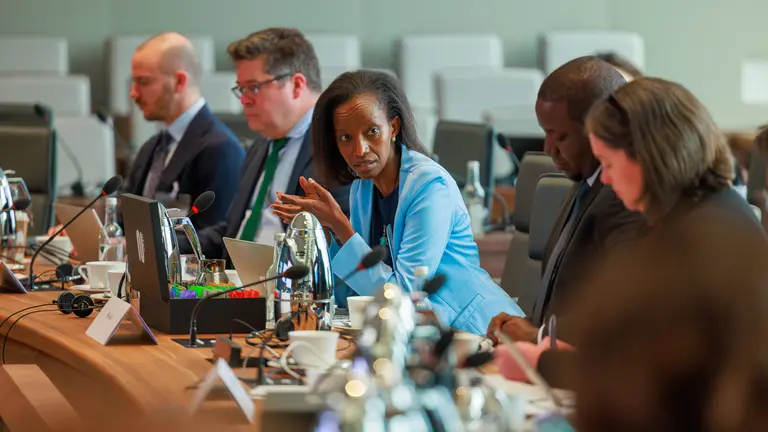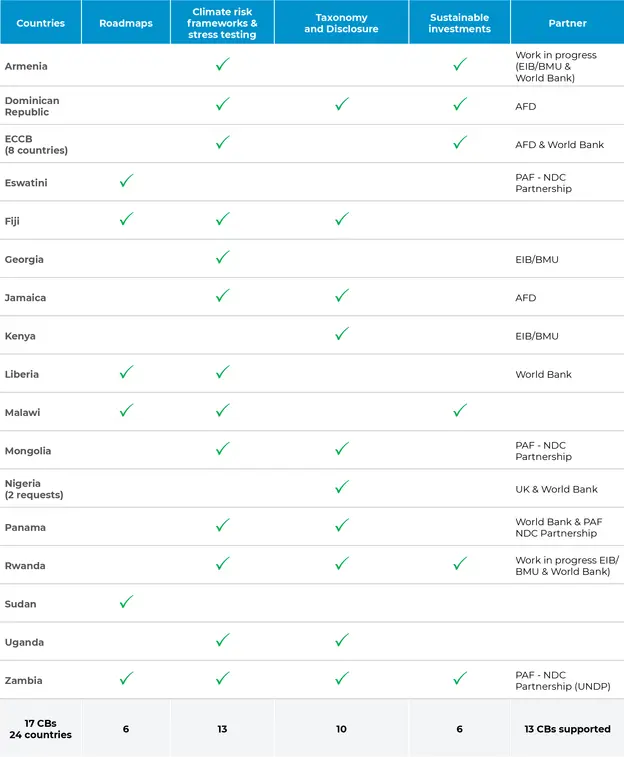
Readiness Support for Greening Central Banks
The physical risks of climate change and an uncoordinated transition to a net zero economy have the potential to destabilize financial markets and significantly affect the global economy. A changing climate poses numerous risks to the financial sector, such as sharp falls in asset prices, reduced companies’ profitability, shrinking public finance revenue sources and increased costs to the insurance industry.
At the same time, the financial sector plays a central role in mobilizing the trillions needed to achieve countries’ Nationally Determined Contributions (NDCs) and decarbonize the economy through Long-Term Low Emissions Development Strategies (LT-LEDS) by midcentury.
Central banks and financial supervisors are uniquely positioned to map, assess and tackle the financial and economic risks posed by climate change, while also identifying and creating mechanisms for a low carbon transition. In 2021-2022, the NDC Partnership Support Unit consulted more than 80 representatives from its members that emphasized (i) the critical role that Central Banks play in the climate change agenda, and (ii) the need to provide in-country technical assistance to strengthen national capacities to mitigate risks and catalyze low-carbon and resilient investments.
In response to member needs, the NDC Partnership launched our Readiness Support for Greening Central Banks (GCB) initiative at COP26.
Objectives
Providing Timely, Coherent, and Coordinated Technical Assistance to:
Build capacities, processes & systems to adopt precautionary approaches to climate risks
Safeguard and promote green investment
Mainstream Economic Advisory recommendations for financial innovation and green investment policies
Strengthen coordination between central banks & ministries of environment & finance

Areas of support
- Roadmaps: designing climate resilient and net zero financial sector transition plans aligned with NDCs & LT-LEDS.
- Climate Risks Frameworks: supporting central banks to map, assess, and implement precautionary risk protection measures against climate change.
- Sustainable Investments: identifying, promoting and safeguarding low carbon and climate resilient investments.
- Disclosure and Climate Taxonomy: developing or strengthening tools, processes and capacities to assess, manage and disclose climate risks and create common taxonomies for the financial sector.
For countries seeking guidance on preparing a Request for Support Letter (RSL), please see the RSL Guidance Note.
Process for Implementing and Development Partners (IPs/DPs) to Respond to RSLs:
- Once a member country submits an RSL, the Support Unit circulates this letter to the headquarter and country offices of its Implementing and Development Partners members.
- The Support Unit organizes exchanges with government focal points and IPs/DPs expressing interest to discuss the scope of support and any finer details related to each request.
- IPs/DPs offer support based on their expertise, resources and capacities.
- The Support Unit collects support offers from IPs/DPs and prepare a formal response to the government.
- Government assesses and accepts support offer.
- Implementation starts.
- Periodic reporting and assessment of progress and experiences for continuous improvement.
Delivery, Governance, and Funding
Three-tiered Delivery Mechanism:
- Embedded advisory support
- Technical expertise provided by Partnership members
- Peer exchange and skills sharing program
Countries Receiving Support

For more information, please contact NDC Partnership Senior Country Engagement and Finance Specialist, Joaquim L. Ribeiro Ferreira Leite: Joaquim.Leite@ndcpartnership.org